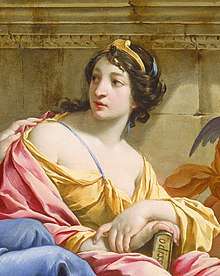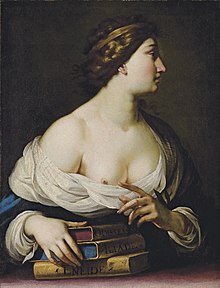Calliope
In Greek mythology, Calliope (/kəˈlaɪəpiː/ kə-LY-ə-pee; Ancient Greek: Καλλιόπη, Kalliopē "beautiful-voiced") is the Muse who presides over eloquence and epic poetry; so called from the ecstatic harmony of her voice. Hesiod and Ovid called her the "Chief of all Muses".[1]


Mythology
Calliope had two famous sons, Orpheus[2] and Linus,[3] by either Apollo or King Oeagrus of Thrace. She taught Orpheus verses for singing.[2] According to Hesiod, she was also the wisest of the Muses, as well as the most assertive. Calliope married Oeagrus in Pimpleia, a town near Mount Olympus.[4] She is said to have defeated the daughters of Pierus, king of Thessaly, in a singing match, and then, to punish their presumption, turned them into magpies. [5]
In some accounts, Calliope is the mother of the Corybantes by her father Zeus.[6]
She was sometimes believed to be Homer's muse for the Iliad and the Odyssey. The Roman epic poet, Virgil, invokes her in the Aeneid (9.525). In some cases, she is said to be the Mother of sirens.
Depictions
Calliope is usually shown with a writing tablet in her hand. At times, she is depicted carrying a roll of paper or a book, or wearing a gold crown. She is also depicted with her children.
The Italian poet Dante Alighieri, in his Divine Comedy, refers to Calliope:
Here rise to life again, dead poetry!
Let it, O holy Muses, for I am yours,
And here Calliope, strike a higher key,
Accompanying my song with that sweet air
which made the wretched Magpies feel a blow
that turned all hope of pardon to despair— Dante, "Purgatorio", Canto I, lines 7 to 12
Honours
Calliope Beach in Antarctica is named after the nymph.
References
| Wikimedia Commons has media related to Calliope. |
- Hesiod, Theogony 79-80. This belief in the goddess's identity, however, really cannot be proved from the text of the Iliad, because there is no evidence as to the referent of θεά (goddess). Neither Kirk nor Leaf makes such a claim in their commentaries on the Iliad. They simply say that she is "the Muse" (Μοῦσα). See G. S. Kirk, ed., Books 1–4, vol. I in The Iliad: A Commentary (Cambridge: Cambridge University Press, 1985), p. 51; and Walter Leaf, ed., Books I–XII, vol. I of The Iliad. 2nd ed. (London: Macmillan, 1900), p. 3.
- Hoopes And Evslin,The Greek Gods. ISBN 0-590-44110-8, ISBN 0-590-44110-8, 1995, page 77. His father was a Thracian king; his mother the muse Calliope. For a while, he lived on Parnassus with his mother and his eight beautiful aunts and there met Apollo who was courting the laughing muse Thalia. Apollo was taken with Orpheus, gave him his little golden lyre, and taught him to play. And his mother taught him to make verses for singing.
- Apollodorus, Library and Epitome, 2.4.9, This Linus was a brother of Orpheus; he came to Thebes and became a Theban.
- The Argonautica, Book I,(ll. 23–34) First then let us name Orpheus whom once Calliope bare, it is said, wedded to Thracian Oeagrus, near the Pimpleian height. Men say that he by the music of his songs charmed the stubborn rocks upon the mountains and the course of rivers. And the wild oak-trees to this day, tokens of that magic strain, that grow at Zone on the Thracian shore, stand in ordered ranks close together, the same which under the charm of his lyre he led down from Pieria."
- Ovid, Metamorphoses, book 5, lines 294–340, 662–678.
- Strabo, Geographica 10.3.19